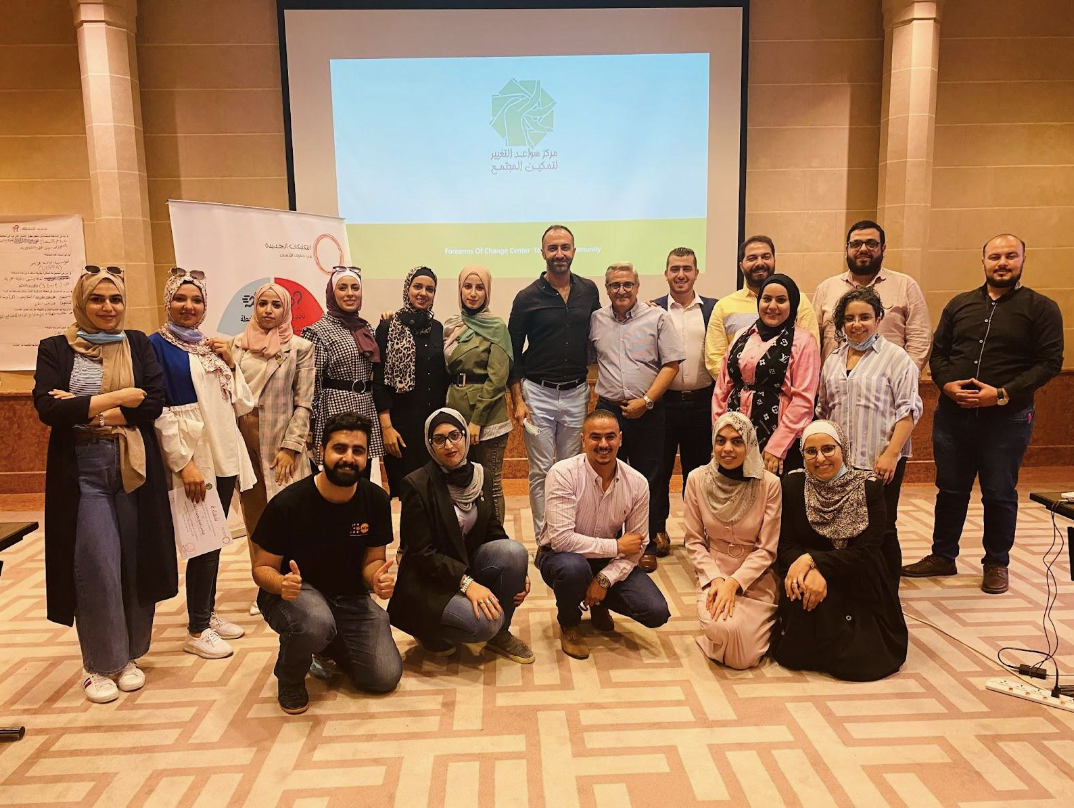Submitted by Malhis on

This article was contributed by Shaden Abdullah, New Tactics MENA Trainer.
Stigma.
Stigma lies at the root of human rights violations all over the world. Entrenched negative attitudes often lead to discrimination against already disadvantaged people. Stigma, whether blatant or subtle, systemic or internalized, damages individuals and society. Activists often have to confront stigma in their work to defend the rights of marginalized communities.
As part of this work, New Tactics in Human Rights partnered with the Forearms of Change Center to Enable Community (FOCCEC). FOCCEC is a non-profit civil society organization that works to help people with HIV/AIDS in Jordan and the MENA region. They work with vulnerable populations in the areas of reproductive health, sexually-transmitted diseases, drug use, and gender-based violence.
New Tactics worked with FOCCEC to train a group of activists on strategies to support stigmatized communities. Participants learned about FOCCEC’s work to identify and address stigmas that impact the rights of people living with HIV/AIDS in Jordan.
Complexities of HIV/AIDS Stigma
People with HIV/AIDS experience stigma from friends and family, healthcare providers, and public policy. Training participants examined the following complexities of HIV stigma in the MENA region:
- Social Stigma
Complex social stigmas act as an obstacle to individuals living with HIV/AIDS. Family and friends may misunderstand how infection occurs. This may disrupt relationships, isolating the HIV+ individual from their potential support system.
As a result of rejection from their social circles, people living with HIV/AIDS experience loneliness and often develop internalized stigma. They may be reluctant to seek medical care and treatment.
- Healthcare Stigma
People with HIV/AIDS often struggle to access healthcare and treatment services. This leads to obstacles in prevention education and access to proper medical treatment.
The stigma around HIV/AIDS can even impact the quality of services provided by healthcare professionals. Many HIV+ patients tell of the difficult treatment journey. Some examples of overt discrimination from medical staff include:
- communicating false information about HIV/AIDS
- refusing to provide healthcare services
- failure to give the patient necessary health information
- perpetuating prejudices about a person’s sexual practices
- inability to provide preventative education
It is critically important for healthcare providers to deter these discriminatory behaviors. They are damaging to the health and livelihood of those living with HIV/AIDS.
- Stigma in Public Policy
While most Jordanian legislations do not explicitly discriminate against people affected by HIV/AIDS, there is a limited adequate protection for them. Some texts can lead to a lack of protection. The Jordanian Penal Code, under the article of violating public morals, allows law enforcement to utilize practices that are inconsistent with human rights.
Non-citizens are even less likely to seek treatment because they risk deportation. They usually refuse to be screened or examined. Healthcare providers are required to report a patient’s HIV+ status to the government. Non-nationals are immediately deported regardless of the risk to their health and safety. Thus, HIV+ non-nationals may not disclose their diagnosis or seek treatment.
Taking action
Training participants examined the interconnectedness of stigma with fear, silence, ignorance, and discriminatory behavior. New Tactics introduced participants to the Strategic Effectiveness Method to address stigmas related to the rights to health, work, and privacy faced by people living with HIV/AIDS. The method provides a 5-step framework for combining diverse tactics into a strategic plan of action.
New Tactics trainers helped participants design action plans that will be carried out in cooperation with FOCCEC. These plans address three specific advocacy areas:
- Treatment in addiction centers
- Violation of privacy and the right to health
- Violations of the right to work
This training opportunity not only contributed to a greater understanding of HIV/AIDS. It also renewed activists’ determination to secure a better life for all stigmatized communities in the MENA region.
Would your campaign or organization benefit from a New Tactics in Human Rights training in the Strategic Effectiveness Method? Check out our training offerings here, or get in touch at newtactics@cvt.org.


